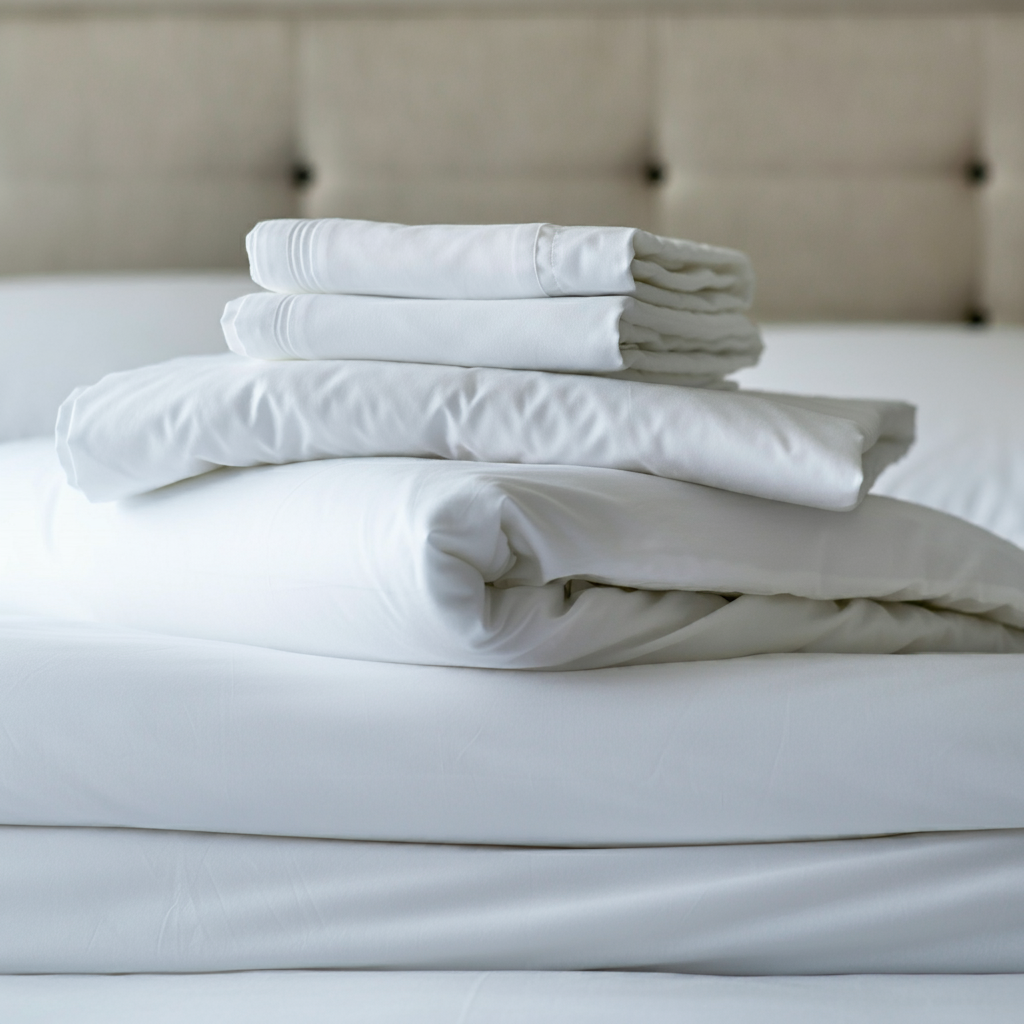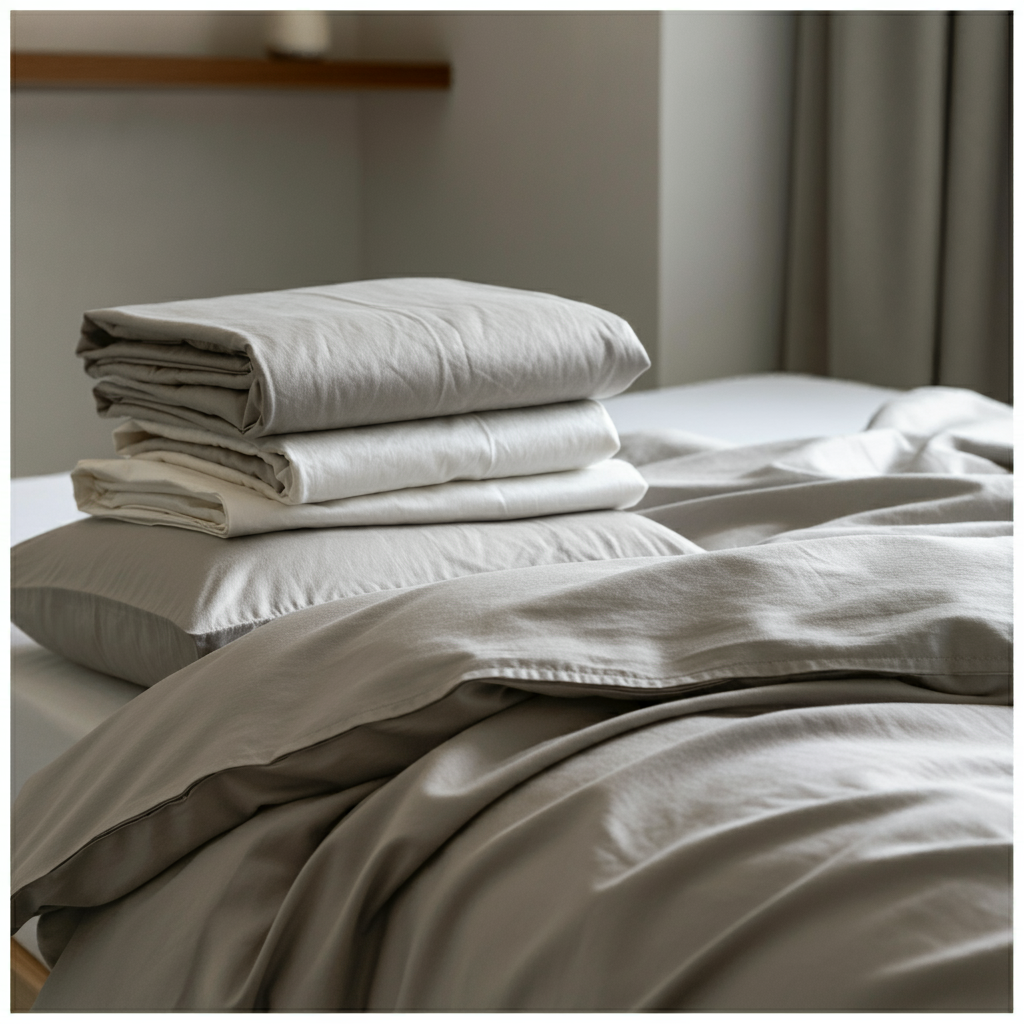To achieve a level of relaxation, things like bedding and how often to wash your bedding come to mind. New, crisp linen adds comfort and reduces health issues like allergies and germs, which can lead to sleep disruption.
Therefore, this blog will highlight how often you should wash your bedding and why these timelines vary. Madame Paulette’s services uphold cleanliness at the highest level. With our unique techniques and knowledge, your linens will stay fresh and beautiful for many years.
In This Blog

The Importance of Clean Bedding
Regular bedding cleaning is crucial for ensuring health and hygiene. The buildup of dust, allergens, and skin cells can affect sleep quality and general health.
- Dust and Allergens: Dust mites can be found in almost all bedding materials, and their presence can cause allergies, especially respiratory allergies.
- Skin Cells: Beddings may also contain dead skin cell buildup, attracting dust mites and germs.
- Sleep Quality: Unwashed bedding may cause skin rashes, breathing difficulty, and other problems, as allergens and odors may make it difficult to sleep well.
- General health: Regular washing is essential to eliminate bacteria and irritants and promote health.

Standard Guidelines for Washing Your Bedding
Here are some of the general maintenance guidelines about how to wash bed sheets and duvet covers.
- Bed Linens: Launder bed linens every one to two weeks to prevent dust, skin flakes, and sweat accumulation. However, for allergy concerns, it is better to wash them once a week.
- Duvet Covers: Wash every 2 to 4 weeks. After a while, they collect dust and even other allergens. In less-friendly environments, consider washing every two weeks.
- Duvets and Bed Covers: Wash duvet or bed covers after 2-3 months.
Sheets and Pillowcases
How often should you wash your bedding? Regular dry cleaning schedule for a washing routine to remove oils, dirt, and skin flakes:
- Bed linens and pillowcases: Wash weekly, as this helps eliminate dirt, oils, and skin flakes from bed sheets and pillowcases. If the fabric allows, wash in clean, hot water.
- Duvet Covers: Clean the duvet cover once every week or two. Remember to turn it inside out to prevent color fading, and use a delicate wash cycle to avoid damaging the fabric.
- Mattress Protector: Wash the mattress protector every two to four weeks. This barrier soaks in the oils and sweat, ensuring the mattress remains cleaner.
Duvet Covers and Comforters
How often should you wash your bedding? For items not in direct contact with the skin, cleaning once a month should be fine until a spill or stain occurs.
- Duvet Covers: Wash the duvet covers monthly to remove dust and allergens unless dirty or under heavy use.
- Blankets and Comforters: Clean after every 1-2 months. Wash a comforter once or twice a month to keep it fresh without damaging the fabric.
- Mattress Protectors: Wash every month to remove dust and sweat.
This is how to wash bed sheets, pillowcases, and comforters using the standard guidelines.
Factors That Demand More Frequent Washing
Some factors require more frequent washing of luxury bed linens. Here’s when should you wash your sheets.
1. Bedding with Pets: Pet hair or fur increases the allergens that demand weekly washing.
2. Eating: Food crumbling and liquid spilling attract bacteria. Washing after every seven days prevents that.
3. Sweating While Sleeping: Body sweat, smells, and bacteria particles occur.
4. Allergy or Asthma: Wash these items every week to reduce the effects of dust and other allergens.
These factors show how often should you wash your bedding.
Pets and Children
Pets and toddlers bring extra dirt, spills, and allergens into the home, so bedding needs cleaning more often. Pets can shed fur or tracks in the mud, while kids are more prone to food spills, bed wetting, and general mess. These factors create stains or odors and build up allergens in bedding. If you know how often should you wash your bedding, you can maintain a healthy and hygienic environment.
Allergies and Asthma
Washing luxury bed sheets is equally essential since it helps remove dust, pet dander, pollen, and other allergens, especially if kids or pets are in the house. Many of these allergens may cause breathing problems and skin irritations.
The question arises: How often should you wash your bedding? Bedding must be laundered frequently to create healthier sleeping conditions and reduce the risk factors for allergies and asthma.
Special Care for Different Types of Bedding Materials
Different types of bedding materials require specific care treatment and methods. Here’s how to wash bed sheets considering their different fabrics:
- Cotton: Machine wash with warm water and tumble dry on low heat. Do not use bleach to prevent its color and fabric.
- Linen: Wash with cold water to avoid shrinkage and maintain its texture. High heat may cause damage. Dry it using air or steam for a finished look.
- Silk: Hand wash in cool water with a mild detergent or dry clean. Do not wring or twist, as this may cause harm.
- Synthetics (like polyester): Machine wash in warm water and tumble dry in low heat. A fabric softener reduces static and keeps fibers soft.
Natural vs. Synthetic Fibers
Natural fabrics like cotton or silk are more delicate than synthetic fibers like polyester.
- Cotton can withstand warm temperatures.
- Silk should be hand-washed or dry cleaned to prevent ruin.
- Polyester is more wrinkle-resistant and endures wet processes, allowing easy fabric maintenance.
This distinction is necessary to determine how often you should wash your bedding.
Enhancing Bedding Longevity with Professional Care
Our professional cleaning services provide specific procedures and quality materials for every type of bedding. Fabrics like silk require advanced cleaning procedures that can absorb contaminants, including bacteria and bugs.
Also, high-quality detergents and advanced techniques preserve the bedding layers’ structure, color, and softness for longer use.
Madame Paulette’s Custom Interior Cleaning Services
Madame Paulette provides extensive services beyond basic cleaning, including specialized cleaning treatments for upholstery, outdoor furniture cushions, and luxury bed linens. Our high-performance cleaning techniques and equipment remove dirt, stains, and allergens.
Moreover, we help preserve all items in their former condition over long periods, bringing luxury to your home’s fabrics.
FAQs
What happens if you don’t wash your bedding often?
Dirty bedsheets can cause allergies, skin breakouts, and asthma if you don’t wash your bedding often.
How often should I wash bedding to prevent dust mites?
The answer to the question, how often should you wash your bedding is at least once a week at 140℉ and replace them regularly.
How long is too long without washing sheets?
If you are wondering how often should you wash your bedding, it depends on multiple factors, but the maximum is one week to wash your bedsheets.
Wrap Up!
Clean and luxurious bed linens are essential for health, comfort, and hygiene because they help eliminate dirt, odor, and, most importantly, allergens. Professional cleaning services, like Madame Paulette, use high-end bed sheets cleaning and expertise to ensure effective cleaning and preserve luxury fabrics.

